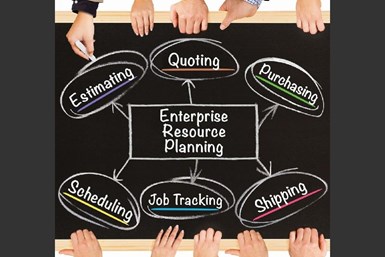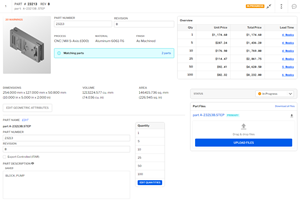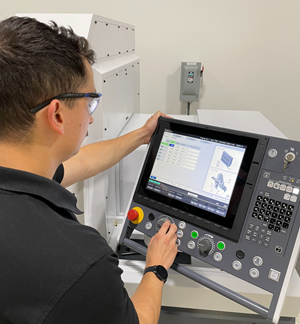How to Choose an ERP System for Your Data-Driven Machine Shop
Manufacturers with an ERP system in place should re-evaluate the system as the essential forerunner of and foundation for emerging data-driven manufacturing concepts.
Share






An ERP system is a connector that unifies management and operational functions.
Enterprise Resource Planning (ERP) emerged years ago as an integrated software system to make manufacturing operations, shopfloor activities and front-office management easier and more efficient. Business owners and managers embraced ERP because they are faced with a series of important, urgent questions every day. ERP helps meet this challenge. It enabled them to make use of a centralized solution that holds company data in a single place, thus providing all of the information required for each department to carry out its role effectively. Depending on the product, ERP supports such functions as estimating and quoting, shopfloor scheduling, job tracking, purchasing, production and manufacturing resource planning, shipping, and financial management.
ERP systems have been available and were widely implemented long before companies began to think about data-driven manufacturing. Today, companies are looking at connecting machine tools and other devices to a computer network so machine-generated data can be collected for analysis and reporting. This data can enable shop managers to boost productivity and reduce downtime. In the meantime, manufacturers with an ERP system in place should re-evaluate the system as the essential forerunner of and foundation for emerging data-driven manufacturing concepts. Companies without an ERP system should consider migrating to one, especially as they eye a move to machine monitoring and shop networking.
However, the market for ERP systems is becoming more saturated. Whether upgrading a shop control system or installing ERP for the first time, businesses may find it difficult decide on the best options. This advice will provide sound guidance:
Consider your objectives and requirements. First, consider exactly what you want from your system. What issues or staff inefficiencies must be resolved? Your answers should be specific in order to narrow requirements for your chosen ERP system. To avoid being overly influenced by marketing from various vendors, list your requirements before starting to research the options available. Discuss these requirements with different team members to ensure that specific needs are met.
Measure return on investment (ROI). Very often, businesses researching ERP systems find it difficult to measure ROI accurately. However, having clearly defined goals and objectives at the start will help considerably. It’s possible to measure ERP performance by:
- Calculating productivity before and after implementation.
- Documenting inventory improvements.
- Counting up savings to customers and whether lifetime value has increased.
Also consider the advantages between in-house and cloud-based ERP. The latter is often the most user-friendly option. It will probably require fewer members of the in-house team to maintain it.
Speak to fellow ERP users. You may find it difficult to speak to direct competitors about their experiences with ERP, but you could communicate with a shop reference who has goals similar to yours and can answer questions from experience. Likewise, you could post questions to online manufacturing groups to gage their opinions.
These are good questions to ask:
- Were any promises not kept by your vendor?
- Does the product do what you expected?
- Were any deadlines missed?
- Are you paying for product extensions that you do not need?
- Were hidden costs discovered after installation?
Scrutinize the demo. We recommend providing the vendor with a demo script that outlines specific functions and features that you will expect to see. Approaching the demo with an open but critical mind will save valuable time and help determine whether the software meets your goals.
Calculate the real cost. It is essential to know the true cost of ERP by calculating expenses at each stage. These include:
- Upfront cost
- Maintenance
- User adoption and training
- Support
- Recurring costs.
With the intense interest in data-driven manufacturing these days, it is all the more urgent for manufacturing companies to re-evaluate the importance of a capable ERP system.
Related Content
Manufacturer, Integrator, Software Developer: Wolfram Manufacturing is a Triple Threat
Wolfram Manufacturing showcased its new facility, which houses its machine shop along with space for its work as a provider of its own machine monitoring software and as an integrator for Caron Engineering.
Read MoreGive Job Shop Digitalization a Customer Focus
Implementing the integrated digital technologies and automation that enhance the customer's experience should be a priority for job shops and contract manufacturers.
Read MoreSwiss-Type Control Uses CNC Data to Improve Efficiency
Advanced controls for Swiss-type CNC lathes uses machine data to prevent tool collisions, saving setup time and scrap costs.
Read MoreReinventing a Precision Shop With a Data-Driven Mindset
When this machine shop lost 90% of its business within three months, a reinvention was in order. Here's how it survived after quickly falling on hard times.
Read MoreRead Next
2025 Top Shops Benchmarking Survey Now Open Through April 30
Modern Machine Shop's Top Shops Benchmarking Survey is now open, offering metalworking and machining operations actionable feedback across several shopfloor and business metrics.
Read MoreSetting Up the Building Blocks for a Digital Factory
Woodward Inc. spent over a year developing an API to connect machines to its digital factory. Caron Engineering’s MiConnect has cut most of this process while also granting the shop greater access to machine information.
Read MoreShop Tour Video: You've Never Seen a Manufacturing Facility Like This
In the latest installment of our “View From My Shop” series, explore Marathon Precision’s multi-process approach to manufacturing, where blacksmiths and hand-forged dies meet state-of-the-art CNC machining. Discover how restoring classic muscle cars and building custom art projects creates a dynamic shop culture — and draws top talent to this unique and innovative metalworking facility.
Read More





















.jpg;maxWidth=300;quality=90)







